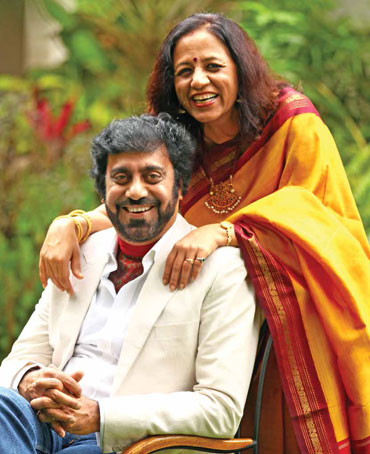
When mutual trust, respect and friendship combine together in harmony, the recipe for a successful marriage is born. And it lives on happily, ever after. Biotechnologist Sangeeta and Corporate Stalwart Venkatesh are stellar examples of this successful togetherness
Some people fall in love but some grow with it. Bangalore-based Biotechnologist Sangeeta Venkatesh and her husband and corporate HR guru Venky fall in the second category. For, even when they were introduced to each other by a mutual friend at a birthday party where sparks flew instantly as they started liking each other, they probably knew what Albert Einstein had once said, “You can’t blame gravity for falling in love.” So, instead of justifying it by saying things like “love is blind,” they simply accepted it.
But was it love at first sight? Smiles Sangeeta, “So, you want a straight answer …All I can say is, we met at my school friend’s birthday party who was also known to Venky. You must ask him about what attracted him to me, but I found he was like no other person I had met till then. What attracted me were his sound value systems, clarity of thinking, and a wide range of interests which included our passion for music. It also helped that he came from a wonderful family. And, let me add, he was a good looking young man too,” she concludes with a twinkle in her eyes.
Venky’s version too is somewhat similar. “Yes, ours is a love marriage. We met through some common friends in Bangalore. In fact, it was a friend’s party where we met for the first time and in a year's time, we were married. In fact, just a few weeks back, we celebrated our 25th marriage anniversary too,” he points out.
Was he studying at that time? “No, no, no,” says Venky, adding, “We met much later when I was working.”
Currently Management Board Member and President-Group HR of RPG Enterprises, he was at ITC when they married. He has had a highly successful three decade long corporate journey. As Sangeeta discovered, what strikes you is his ability to stand out and present himself time and again as a leader, not a follower satisfied with the status quo. Having worked across multiple sectors—-FMCG, energy, telecom/ IT services, textiles/fashion/retail and metals & mining ---Venky’s rich experience spans MNCs, diversified Indian business groups, private equity and consulting.
A product of Mumbai’s Tata Institute of Social Sciences, he got campus placement soon after completing his Master’s in Personnel Management in one of the finest Indian conglomerates, the $8.3 billion ITC Ltd. He could have continued in ITC till his retirement but being someone who was born with an entrepreneurial DNA and a neverending quest for more knowledge and newer experiences, he went on to work for several marquee companies like Powergen Plc (Director HR-India/Middle East), BPL Innovision Business Group (Executive VP-Group HR), Arvind Ltd (Group President- HR) and such others. But perhaps his most challenging assignment was to provide Global HR leadership as President Group- HR to the $13 billion Vedanta Resources, a listed company in the London Stock Exchange and a constituent of FTSE 250 index. Venky handled key assignments in this Indian-origin company with a globally diversified metal and mining profile with deep interests in non-ferrous metals including zinc, lead, silver, copper, aluminium, power, as well as iron ore and oil & gas operations. He led Vedanta’s HR function across its business operations spread across India, Australia, South Africa, Namibia, Zambia, Liberia, Ireland and Sri Lanka as it kept acquiring new companies, adding thousands of employees to its working landscape.
Though entrepreneurship comes with no guarantees as it is synonymous with risk-taking, Venky got bitten by this bug in the post-Vedanta phase. He founded a boutique HR advisory firm ‘Svanishta’, offering a new concept in outsourcing strategic HR initiatives to CEOs of companies across sectors including healthcare, auto, textiles/fashion and IT. As their HR advisor, Venky offered several transformative initiatives and unique products to his clients but unfortunately his dream venture could not last long and hit an inflexion point after about four years - .challenges being funding and consequently scaling up. But it did not deter him to give up his enthusiasm and so he re-entered the corporate world in 2014 with fresh energy to write a new success story for Harsh Goenka- led $3 billion RPG Enterprises. Comprising over 15 companies in the areas of infrastructure, tyres, technology, and speciality, Venky is trying to make an impact with his spirit of innovation in companies like Ceat Tyres, IT firm Zensar Technologies, infrastructure company KEC International and pharmaceutical company RPG Life Sciences, to name a few.
So, how were the early days of their post-marriage journey? Reminisces Sangeeta, “Oh, they were lovely. When I got married, Venky was with ITC where the culture was akin to the Armed Forces which I was familiar with. I think it was a great experience as ITC was like a large family.”
But what happened later when Venky switched over to other corporate giants like Powergen, BPL, Arvind Group and Vedanta, to name a few? Sangeeta states, “Well, you’re right. Venky worked with many other corporate entities after ITC, but that has not affected our personal life except for the fact that he was travelling much, much more.”
What attracted me to him were his sound value systems, clarity of thinking, and a wide range of interests which included music. It also helped that he came from a wonderful family. And, let me add, he was a good looking young man too - Sangeeta
Incidentally, Sangeeta was born in Bangalore, to an army officer/ civil engineer father and a mother who was a school teacher. Going down memory lane, she recalls, “Thanks to being an ‘army brat’ I have had the privilege of traversing the length and breadth of the country. Perhaps the best childhood memories were when my father was posted in Arunachal Pradesh with the Border Roads. However, thanks to the frequent transfers, my parents deemed it fit to put me in a boarding school so that my education would not suffer. Thereafter, I studied at the Lawrence School, Lovedale which is nestled in the pretty environs of the Nilgiri Hills in Tamil Nadu. The school has perhaps been a major influence in my life and I had the good fortune of being the Head Girl and being awarded the President’s Medal in my final year at school. From an early age I had this urge to ‘clean up’ the country but did not know how to! I was dreaming of a ‘Swachch Bharat’ even back then!”
So, what led her to become a biotechnologist? Says Sangeeta, “I did BSc from Bangalore University and MSc in Biotechnology from MS University, Baroda. I was part of the 2nd batch of students after the course was introduced in the country. Biotechnology broadly can be defined as the use of biological processes for the betterment of the humankind and the environment. For me the environment and our Planet Earth have meant more than anything else. Indeed I opted to work on the problem of sanitising sewage sludge for use as fertiliser for my Masters programme dissertation. Subsequently I went on to be a Researcher at the Indian Institute of Science, Bangalore. However, I took a break from research after marriage and to be a full time mother of two boys. Also, Venkatesh was transferred to Saharanpur and the location did not give me scope for work.”
So, how was her journey into the professional world and the kind of jobs she did when she got back to work in the past few years? Says she, “After we got back to Bangalore, I tried to pick up from where I had left off, albeit slowly. I had a stint as a Special Correspondent with the national magazine ‘Education World’ and this gave me an opportunity to write on issues relating to education, science and the environment. I also managed to do a course in ‘Environmental Journalism’ at the Centre for Environment Education. Thereafter I joined the ‘Institute of Bioinformatics and Applied Biotechnology’ (IBAB) as a Consultant. This was the time when Bangalore was getting prominence not just as an IT hub but as a Biotech hub too. At IBAB, I co-organised a conference with Prof Dr Shyama Ramani, who is currently a professor of Economics at the United Nations University at Maastricht, Netherlands. Meeting her has been a major turning point in my career as I have had the opportunity to work on international biotech projects with top universities in the US and Canada. Alongside I have also been a freelance writer too and have also published a book titled Celebrating the Earth - Stories about Prithvi.”
Some people fall in love but for some, love grows on them. They probably knew what Albert Einstein had once said, “You can’t blame gravity for falling in love”
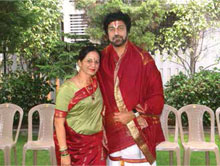
Continuing with her story a bit further, she adds, “My interest in waste management was triggered when we moved to our home in Whitefield in suburban Bangalore in 2002. I observed truckloads of trash been taken from our community and being dumped near a village called Hoskote. It was horrific – like dumping your house waste in someone else’s backyard. I researched and contacted Waste Wise, an NGO, to come and help us and we were perhaps one of the few communities to start segregation and scientific management of waste. It was my first exposure to the awful concept of landfills which is the cause of groundwater and soil pollution and a host of other environmental issues.”
Sangeeta is currently Research Director of a social enterprise called SocioTech Innovation- 4Change (Sti4Change), which she co-founded with her colleague Prof Shyama Ramani. Talking about how she got associated with it, she recalls, “The 2004 tsunami changed my career graph. Prof Ramani was dismayed at the devastation that was caused by the tsunami. She decided to work for Kameshwaram, a coastal village near Nagapattinam. Our discussions with the residents of Kameshwaram revealed that prior to the tsunami there was plenty of green cover with trees, which helped the women of the village to defecate in the open. The men in turn used the beach. The village did not feel the need to have toilets at all, even though these sites attracted mosquitoes during the monsoons, leading to diseases. Post-tsunami, it became a challenge for women to find secluded spots to relieve themselves who sought privacy in rubbish heaps, where there was danger of getting bitten by rats, scorpions and even snakes. Moreover, women could relieve themselves only at dawn and then had to wait again until dusk. Sexual harassment was also a reality for the hapless women. Hence, we took up sanitation coverage for women as a priority. This led to the formation of the Friend in Need, India (or FIN Trust) which functions as an action- research unit with strong participation of students and volunteers from various walks of life. We are trying out various forms of ‘decentralised’ and sustainable systems of sanitation which recycles human waste without any risk of contamination.” We found that there was also a need for research and documentation of studies on sanitation and as Research Director of Sti- 4Change, I am now actively involved in the area of school sanitation and waste management. Needless to say I am very happy and passionate about doing this work which is trying to address the most basic need of a human being.”
By the way, what happened when all of a sudden Venky left his cosy job at Vedanta to become an entrepreneur with his HR advisory firm ‘Svanishta’? Talking about that experience for the family and how did this name come about, reminisces Sangeeta, “That was an interesting phase in our lives when Venky turned entrepreneur. I don’t say this because I am his wife but Venky is a ‘doer’ and is unafraid to take risks albeit calculated ones. Though Svanishta kept him busy, he had more time with the boys who were in their teens at that time and that was wonderful. The word ‘Svanishta’ gets its root from the Sanskrit words ‘Sva’ which means ‘one’s own’ and ‘Nishta’ which means ‘faith’ or ‘proficiency’ and we thought it was an appropriate name for one’s own entrepreneurial journey!”
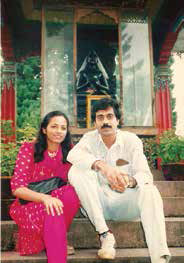
Both Sangeeta and Venky are very deeply attached to their sons. Talking about them, she says, “Achintya is 22 years and Ananjan 19. Achintya is in his 2nd year of MBA at TAPMI, Manipal and Ananjan is in the sophomore year of his Bachelor’s degree in Business at the Hong Kong University of Science and Technology (HKUST). Achintya is an extremely talented artist and a voracious reader while Ananjan has his leanings towards music and we encourage them to pursue those passions in addition to their academics. I think we are done with the ‘bringing them up’ part but we are always there when they need our support. The values that we have tried to inculcate in them are the ones we believe are time-tested and eternal-- ‘Faith in the Almighty’, ‘Faith in yourself’, and sound ethics,” she points out. Answers Venky, on his aspirations for his sons, “They have to be good human beings with good values because we’ve tried to give them the same family values we received from our parents and which have continued in our family ever since. So, I only hope that they take it forward.”
Talking about how they chose their subjects, Venky adds, “Yes, they both decided their subjects themselves. In fact, I give them the freedom to do something very different. I told my elder son, who is a good artist, if you want to follow art, go to France or Germany and learn art. I said I'll support you. I didn't want him to do an MBA or CA or anything like that. In fact, even now, I ask him, are you sure you want to do an MBA? to which he says, ‘Look, it’s very unusual. Generally it is the other way round, but here my father himself is so pushy!’ But I don't put any pressure on them. They have to create their own success. They will also learn through mistakes as all of us have learnt.”
Sangeeta: I take up as much work as I can manage and the family will always be my priority. I think we all get involved as a family while resolving any issue but I admit we rely on Venky’s sound advice at all times.
Venky: I follow a strong work ethic culture without infringing on too much personal time.
It’s all about self-awareness and self-discipline.
‘Truckloads of trash were taken from our community and dumped near a village called Hoskote. It was horrific – like dumping your house waste in someone else’s backyard’
Sangeeta: Mutual respect and friendship. Youngsters are smart enough, but I would add that any relationship should flow naturally without analysing who ‘takes’ or ‘gives’ more - as is often discussed these days.
Venky:Mutual understanding, trust and appreciation. As for today's youngsters, I think they are pretty aware. They are far deeper in their thinking than us. They only need a little bit of resilience. They must not be disheartened by failures or lack of success. Don't get pressurised by peers or even by your father and mother about what you want to do. Carve your own path. Whatever you do, be clear that money may not come immediately and life may still be hard. You may have grown up in very luxurious surroundings but when you start your own careers, and tomorrow you want to do something which is off the beaten track, initially you might not earn the income that will give you that kind of life-style, so you should be prepared for that. But one thing you must always keep in mind is: Never ever compromise on ethics and values because these are non-negotiable. Don't be political in organisations because it doesn't pay in the long term. Reputation is the only asset we have. I've realised people who try to play with all of this—even very big people having big names-- have crashed eventually.
Sangeeta:I like to swim and work out. I have learnt Hindustani classical music for many years and I love this genre of music. I also enjoy retro English and Hindi music. All of us in the family like to travel – both domestic and international. If it is just the two of us, then Goa is a favourite. We like to take pilgrimages too as often as possible.
Venky: I love travelling and my other hobbies include music and reading autobiographies. Recently I read a book about Alexander and another book on Egyptian history. I used to find time for travelling. Now I'm not finding time for personal travel but business travel we do all the time.”
Sangeeta: Professionally I want to do much more. And, in the coming years I see myself working with schools on sanitation and waste management programmes including working on modules for teacher training. I think this alone will take a life time.
Venky: No matter what goal I have, after achieving it, I feel that I need to do more because I’m never satisfied. To me, satisfaction does not come from money or material things. It is a question of your attitude and feelings about who and what you are.
Sangeeta: Be at peace with any situation! Or else work towards resolving situations that do not give you peace.
Venky: Be willing to go where nobody else will to make it happen.
There is an old saying, “No risk, no gain” and so, if you’re not where you want to be in life, then you must start taking positive, calculated risks, as Corporate India’s top HR boss Venky’s career journey illustrates…
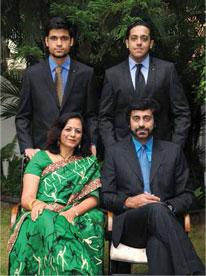
Maxwell Maltz, American cosmetic surgeon and author of Psycho-Cybernetics, once said, “Often the difference between a successful man and a failure is not one’s better abilities or ideas, but the courage that one has to bet on his ideas, to take a calculated risk, and to act.”
Though HR leaders in India’s corporate sector are generally not known for taking risks, there are few who consciously do.
Mumbai-based S ‘Venky’ Venkatesh is one such. Now Management Board Member and President-Group HR of RPG Enterprises, he has worked across multiple sectors—-FMCG, Energy, Telecom/IT services, Textiles/fashion/ retail and Metals & mining --- -- with MNCs, diversified Indian business groups, private equity and consulting.
To know how he navigated through his exciting career journey, Corporate Citizen spoke to this extremely soft-spoken and tall HR leader who considers himself a ‘people evangelist’ and whose passion for excellence makes him truly inspiring.
I grew up in Chennai in a family of professionals. My father's was a family of lawyers and judges. My mother was from Mumbai and had a very cosmopolitan background. She was a postgraduate, in those days quite an achievement. I grew up in a highly liberal and cosmopolitan atmosphere. Ours was a highly spiritual kind of a family which believed in traditional Indian values but had a very modern outlook too. My father was a fairly successful executive who used to work for Perry & Co, one of India's oldest firms, which is now part of the Murgappa Group. Subsequently, he worked for the ACC Group. He also lived in Mumbai for a few years. So, my early years were spent predominantly in Chennai where I went to a 150-years-old, Anglo-Indian missionary school, St. Beads’, which again had a very cosmopolitan set of students.
Unlike kids of today, we didn't have that kind of burning ambition and we were not clear about what we were going to do. But I was always fond of history because my mother was a history teacher. I admired great personalities from history. For example, someone like Abraham Lincoln and of course all the great Indian social reformers, particularly Swami Vivekananda whose lectures on serious social issues inspired me a lot.
I always wanted to pursue a career where my core strengths are utilised. I liked the whole concept of relating to people, changing the status quo, bringing up change. I would have felt very bored if I had gone for something like Chartered Accountancy and had to work as an accountant for the rest of my life. That's why I think I gravitated towards a function which had a lot of people integration and about which I was pretty confident. Even when I was young, I never had stage fright. We were not as assertive as some of the younger generation is today but I was fairly confident. So coming into HR was not an accident but destined. Probably, I would have done well had I been an R&D scientist because at one stage, I was pursuing physics very seriously and I used to love astronomy and astrophysics. I’m still fascinated by outer space. As you grow older, religion, spirituality and who created it all starts blending with each other. You don't think of them as separate. Science and religion are indeed together.
Oh yes, once you get into TISS, there is no other option because you are studying to become that. For the first time, I had moved out of my hometown, lived in a Mumbai hostel, went to a number of companies for field work and then, got through to ITC in the campus recruitment.
In our days HR meant purely industrial relations or labour relations. The very sophisticated HR that you see today was there in very few companies and I was lucky enough to join one such — ITC—which had a very strong IR function even in those days. Otherwise it was a strong HRD function. There was a management development group but choosing this as a career wasn’t a well thought through strategy. Unlike today’s kids who think that they want to get into marketing or finance or HR, we didn't have any such strategy. In a way, it is good that there were no such expectations.
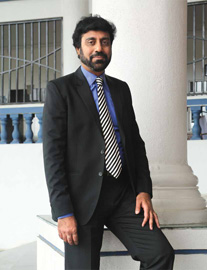
That was ITC where I spent the first 10 years of my life. I joined the corporate office which is located in a very beautiful heritage building called Virginia House in Calcutta. On my first posting, they sent me to a place called Munger in Bihar which had our oldest factory and the most difficult place in terms of industrial relations. The day I reached Munger, I landed into a gherao situation. We were all locked up for eight hours by the workmen and before I had a detailed induction, I was asked to take the responsibility of conducting a domestic inquiry dealing with indiscipline. So, it was baptism by fire straight away. Then, I was moved to Bangalore where ITC had a very large operations and I worked as an Assistant HR Manager there. Very quickly, in the fifth year itself, I became the HR Head of North India and the Saharanpur factory which in 1992 was almost a thousand crore business. I was very fortunate that I got quick breaks.
I was very fortunate that I got quick breaks. Unlike other companies where a factory HR head was more like an administrative head or merely an IR head, it was a leadership role in ITC where you are responsible for IR, labour relations and the management staff development. So, it was a good experience. But when I was about to go to the Head Office or to another country as the HR Director, I decided to leave the ITC after 10 years and joined a multinational power company as their India-Middle East HR Director.
Leaving ITC was more a decision for moving up in my career than anything else. In ITC, even though I was playing a large role, at the end of the day, it was like senior middle level management reporting to senior management. However, in Powergen PLC, I got the opportunity to work as a Regional HR Director and that was a big job involving operations of the Middle-East also. Getting that opportunity at the age of 32 was not easy. Moreover, it was a truly global company when I decided to join it. Those were the early years of liberalisation when Indian multinational companies were becoming ambitious and big. I wanted to catch that wave. In an MNC, you are still part of a bigger set-up, a subsidiary company in India. But if you join a BPL or Vedanta or RPG, with the global HR role based out of India, you get an opportunity to take a lot of strategic decisions which you cannot get in an MNC. In most MNCs operating in India and these kinds of geographies, you have to focus only on execution of the strategy which is decided in the US or UK or Europe. So, I decided to catch the bandwagon.
The telecom sector. I joined BPL Innovision where I worked for Mr Rajeev Chandrashekhar (RC) - the man who laid the foundation for telecom revolution in India. He was an entrepreneur then, now an independent Rajya Sabha MP and a former FICCI president. RC was my boss at BPL Mobile. In fact at that time, BPL was bigger than Airtel. I learnt a lot, saw new growth in cellular phones in the Indian market and for the first time I worked for an Indian promoter. RC was 34 and I was 33. So, we both were very young and it was a good learning process. Later, in 2005, he sold the company to Essar Group. Therefore, I had to move.
Vedanta was wanting to really grow. When I joined them, they were about 4,000 crores and in the fifth year when I left them, they were a 9 billion dollar company! Every year, we were acquiring a new company. Suddenly you work for a truly global company with primary listing on the London Stock Exchange and ranked on FTSE, or footsie as they call it in UK.
Vedanta was all about scale. You had to manage the diversity of the workforce. We were acquiring companies in Zambia, Armenia, Australia and so many other places. One day we would acquire Hindustan Zinc which was a public sector company, where 8000 people would come on board in a single move, another day it would be BALCO or Bharat Aluminium Company and 5000 people would come on board. Then we acquired Konkola Copper Mines in Zambia where 10,000 African nationals came in. So, I was managing diversity and scale. Then there was public versus private sector culture to manage. Working in Vedanta was like working for a gigantic start-up: establishing systems, processes and institutionalising them, leading the business operations of a global workforce. Since there was no well-defined HR organisation before me at a group level, I had to establish and bring in common systems, and cover the entire leadership population with sound policies and processes.
‘We want thinkers. We want people who have extremely good communication skills and the ability to engage with all classes of societies. I think our B-school education must train them for all of that’
I've consciously taken risks in my career. I could have continued in ITC and retired after 30 years but I didn’t do that. Similarly, I might have continued in Vedanta till my retirement but again I chose not to. I have this philosophy that if you are not learning something new or not acquiring new skills and polishing the old ones, you are not growing. So, you should constantly explore and exchange new ideas and keep yourself updated about new trends and keep trying something new. I have never been afraid to take risks because I see them as great opportunities.
I became an entrepreneur. I wanted to try out a new model for HR. Named ‘Svanishta’, its signature line was Director HR for Hire. For a company which is between, say 1000 and 3000 crores, you don't need to hire a person like me at such a high salary. You can continue with your current organisation but I will join you as a virtual layer on the top. I'll provide you the strategy and all the push in the system and help the internal team execute it. The biggest complaint people have about consultants is that they come, they advise, they give a manual and then they go off without telling who is going to implement it. I provided them the option of choosing that last person. So, they were very happy.
I worked for the Apollo Hospitals Group, TBS Group and some others who liked the model.They had nothing to lose. If they found it was not working for them, they could close the arrangement any time.
In retrospect, probably this business model was ahead of its time in India. The problem was that you could not scale it up. In a business model which I was trying to float, you needed a larger optimisation. But here I was the only consultant; I needed 10 more people to help me. I needed an office. I needed 10 more offices. I needed a lot of consultants to go to companies and get business and for that, I needed a lot of investment. I looked for funding. I went to several venture capitalists and private equity organisations, but they said, this is not a scalable business because consulting is in the head of the individual. There is no product. There is no intellectual property. So, if tomorrow something happens to you, then the whole business model is gone. So, funding was not possible.
No. It's there but only as a legal entity. Right now, it's in a freeze mode.
RPG was planning a succession. The current and existing HR head of the group, who I've known for a long time, reached out to me and said, Can we look at you as a candidate for this succession? But I wanted to know what the company’s commitment level to HR was because it’s pretty questionable in a lot of companies. I’m happy to say that RPG's commitment to HR has always been good. Our chairman, Mr Harsh Goenka, is known to be very people-friendly and HR- friendly chairman. That was one of the reasons why I took up the RPG offer.
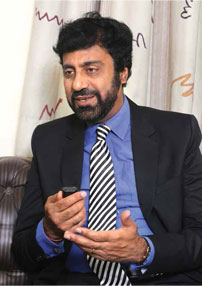
I'll summarise it through our Vision Statement that we've just developed through a bottom-up process. We spoke to a lot of people, leaders and employees. Our current vision is: Unleash Talent, Touch Lives, Out Perform, with a smiley emoji at the end which says, do all of this feeling happy. We are likely the only company in the world which has a smiley in its Vision Statement, which is a very serious intent statement. The current challenge is: how do we get our new growth driven strategy implemented through our people? Each of the sectors we’re working in is in a mode where they have to go to the next level otherwise they will not be competent. Like, for instance, our infrastructure sector is facing a very difficult and complex environment in the country. We’re in the transmission and distribution of infrastructure. We put up those big towers you see all over the world. This company is called KEC International.We are also into sectors like Railways, Water and Solar energy. Similarly, we're now selling our Ceat tyres to the whole world. We are competing with the likes of Bridgestone, Michelin, Continental. In IT, we are tier-two players. How can we become a tier one player? These are some of the challenges we face. We want to be a far more entrepreneurial company, far more innovative. We also want to be a far more ambitious company that is brand and consumer-driven, that attracts the youth. We were at one time amongst the top five industrial conglomerates in the country but today we are not. How do we get back to that position? We don't want to compromise only for the sake of size. We don't want to lose our value systems and people orientation for that. Maintaining all of that, how do we become more ambitious and aggressive--that is the challenge.
‘I always wanted to pursue a career where my core strengths were utilised. I liked the whole concept of relating to people, changing the status quo, bringing up change. That's why I think I graduated towards a function which had a lot of people integration and about which I was pretty confident’
We’re now a very youthful group where we address each other on a first-name basis, including the chairman. This has obviously broken down the psychological barrier of hierarchy and brought in a culture of informality. Though it’s but a small and symbolic change, I call this ‘stratospheric’, given the nature of our businesses. The other thing, which I'm personally working on, is about a campaign we call RPG Talent First. It simply means we are not going to look for external talent before we give the first opportunity to our own internal people. How do you put your bets on someone who is 80 % ready but not 100 per cent. But he is our internal person. We've known him. Why should I go and hire somebody from outside who I don't know, but who I think is 100% ready? All good companies provide the first break to their internal talent. So, I'm running this campaign to meet some of these challenges because we are not the biggest company in any of the sectors we’re working in. We are necessarily not the number one paymaster. We pay well but we are not number one. So, only aggressive career growth will make people want to stay with us. We also want to have Out Performance embedded in the DNA of our employees. We don't want to be number 3 or number 4. We want to be number 1 in all our sectors.
I completely support it. We try for gender diversity in our company and want to be as inclusive as possible because diversity also provides richness. Look at our India, it’s such a rich country only because of diversity.
Somebody who is able to think out of the box, who is able to challenge the status quo, who has maintained a good reputation and who has got great energy. He should be resilient and take success or failure alike. He must have the capacity to recover quickly from difficult situations. But, above all, he should be somebody who is very good with people. I normally don't hire those who may be most brilliant in academics but who are not good with people. I just don't hire them.
I think they need to be more liberal in their course content. We cannot be teaching students only about marketing, finance and HR because there is much more to learn. We need more rounded profiles. We want thinkers. We want people who have extremely good communication skills and the ability to engage with all classes of societies. If they don't know how to talk to the labour class, their intellect is of not much use. I think our B-school education must train them for all of that. You may teach them corporate governance and ethics and values but if they don’t know how to engage with people, they won’t survive.
By PRADEEP MATHUR